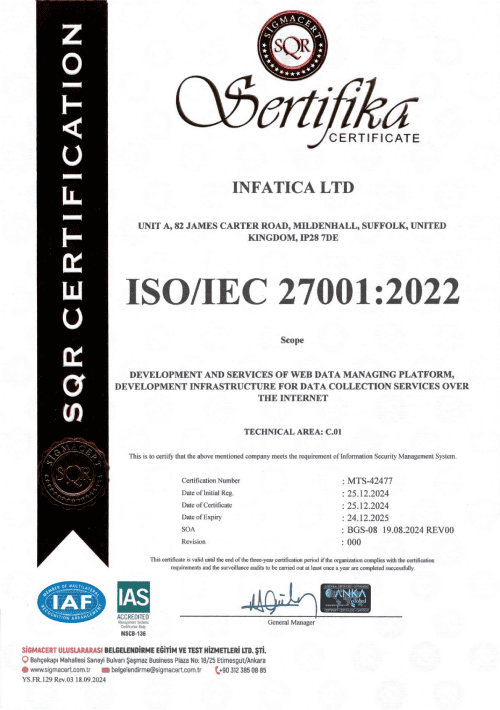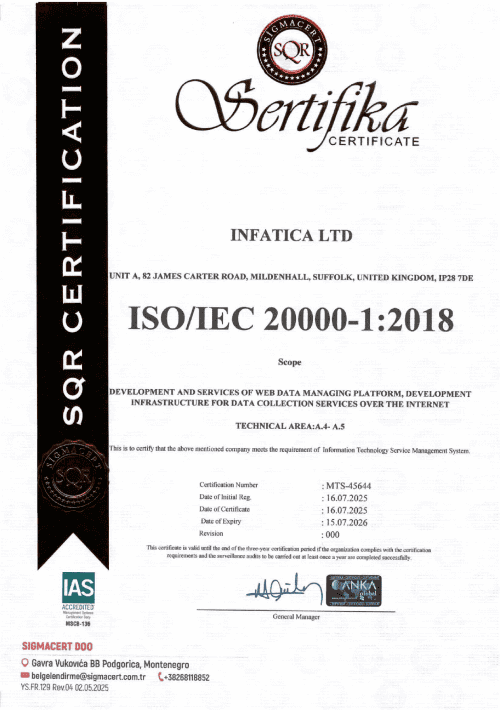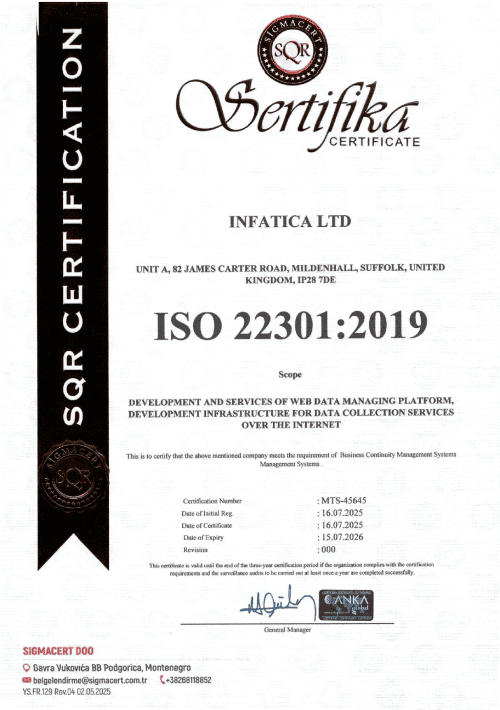Certifications in Security & Compliance
Infatica adheres to the highest international standards in security, privacy, and operational resilience. Our ISO certifications validate that our processes, infrastructure, and governance frameworks meet stringent requirements for data protection, business continuity, and service management. These certifications ensure that clients and partners can rely on Infatica to maintain compliance with global regulations while upholding the integrity and security of their data.

ISO 27001:2022 – Information Security Management
The ISO 27001:2022 certification reflects Infatica’s systematic approach to information security. It validates that we implement comprehensive controls—including risk management, access control, and encryption—to protect sensitive data. Compliance with this standard ensures alignment with global regulations such as GDPR and reinforces trust in our security posture.
ISO 27701:2019 – Privacy Information Management
As an extension of ISO 27001, the ISO 27701:2019 certification underscores Infatica’s adherence to strict privacy information management (PIM) principles. It ensures lawful and transparent processing of personal data, addressing requirements under GDPR, CCPA, and other privacy frameworks. Clients benefit from verified safeguards for data subject rights and confidentiality.
ISO 20000-1:2018 – IT Service Management
The ISO 20000-1:2018 certification confirms that Infatica’s IT service management (ITSM) processes align with internationally recognized best practices. This standard ensures consistent service delivery, operational transparency, and continuous improvement, enabling organizations to trust Infatica’s ability to meet agreed-upon service levels and maintain reliable performance.
ISO 22301:2019 – Business Continuity Management
Infatica’s ISO 22301:2019 certification demonstrates our commitment to operational resilience. This standard requires robust business continuity planning, ensuring that critical services remain available during disruptions. By certifying our processes, we provide assurance that client operations dependent on our infrastructure are protected against unforeseen events.
Frequently Asked Questions
- Proxy pricing is usually calculated per gigabyte of traffic. Several additional factors like proxy type (datacenter IPs are typically cheaper) and monthly traffic volume also play a part. High-traffic proxy plans, for instance, can make each gigabyte as cheap as $2; in a regular pricing plan, gigabyte would cost $7.
- Yes – you can find proxy providers all across the web. Their offers are likely to have key differences: Some providers offer the pay-as-you-go model that requires additional funds, while others will ask you to sign up for a monthly commitment. As for Infatica, we feature both of these proxies price models – and our pay-as-you-go plan is also customizable.
- Proxy servers require constant upgrades and maintenance, which is reflected in the proxy cost. High-quality and white-listed IP addresses also make it costlier. Still, the cheapest proxies can charge as little as $1-2 per gigabyte. In certain scenarios, free proxies can be an OK alternative.
- A working sneaker copping setup needs datacenter proxies as a minimum, which can cost a few dollars per gigabyte. To encounter less CAPTCHAs and IP bans, use residential proxies – although the price is higher, your sneaker bot will work much faster.
- A cheap pre-set proxy server would cost $3-4 per month. However, its key features (bandwidth, threads, IP authorization, proxy pool, etc.) would be severely limited, which makes it less fitting for a large-scale project.
- Free proxies can be OK for testing purposes when you’re just starting out. Keep in mind that free proxies are often overburdened by the large number of network users, which leads to frequent CAPTCHAs and IP address blocks. More importantly, free proxies might sell your traffic to ad agencies or even try to steal your sensitive data.
Yes, if your proxy provider upholds its ethical code, ensuring that the proxy server infrastructure can resist hacker attacks – and that the IP addresses are sourced from consenting users.
Conversely, sending sensitive information over free proxies may be dangerous as it may get intercepted by third parties.
- Yes – both iOS and Android devices can be configured to use and typically need the server’s dedicated domain and port to run. This gives way to mobile proxies – mobile devices that can route your traffic through the proxy network, which makes tasks like social media management much easier.
- Yes – a residential proxy is simply a network utility which routes your traffic. Moreover, said traffic is typically encrypted and the proxy changes your IP type and/or address, which makes using the web with proxies more secure and private. Last but not least, a residential proxy will never cause a service like Google or Amazon to ban your account.
- Head over to your Client Area to view the traffic dashboard, proxy package details, billing page, quickstart video, and more.




